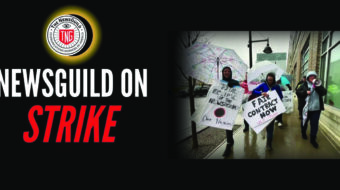
On May 6, 1937, in the midst of tobacco workers strikes and protests in Richmond, Va., 400 Black women tobacco stemmers spontaneously went on strike at I.N. Vaughan over meager wages and lousy working conditions. The women averaged $3 a week in wages, sometimes working more than 80 hours a week in cramped conditions with dust coating the air and their lungs.
Writing in The Crisis, W.E.B. Du Bois described the upsurge among Black women and men tobacco workers as part of the great industrial union organizing drives, “In the spring of 1937, the great impetus given by the CIO [Congress of Industrial Organizations] to unionization within the basic industries had repercussions as far south as Richmond where three hundred tobacco stemmers in the Carrington and Michaux plant undertook a spontaneous strike.”
The workers won – with the help of the Southern Negro Youth Congress – a wage increase, an eight-hour-day/40-hour-week, and collective bargaining recognition.
Du Bois continues, “On the heels of the Carrington and Michaux settlement, another walkout of four hundred stemmers occurred at the I.N. Vaughan factory. At this time a bargaining apparatus had already been established, and again a contract hoisting wage and reducing hours was signed.” These strikes were the first in the tobacco industry since 1905, Du Bois writes.
Du Bois gives a great deal of credit to the work of the Southern Negro Youth Congress and its leadership, particularly James E. Jackson and C. Columbus Alston, for helping drive the industry’s unionization and subsequent improvement in wages and conditions. Jackson, an early pioneer of the civil rights movement and leader of the Communist Party, co-founded the Tobacco Workers Organizing Committee. In CIO-style, Jackson and other organizers mobilized the entire Black community, wedding workers’ rights with civil rights, and coupled it with the credo of black-white unity. White women workers in the CIO’s Clothing and Textile Workers Union walked the picket lines in support of striking tobacco workers, shocking segregated “Richmond society.
In “The Indispensable Ally: Black Workers and the Formation of the CIO,” authors Bill Fletcher Jr. and Peter Agard write that through the work of the CIO and SNYC “workers became transformed through the process of building the union. Many of the Black women, who had been told time and again that they could do nothing of the kind, showed talented leadership and organizing skill, such as that exhibited by the secretary of the union, a Mrs. [Louise “Mamma”] Harris.”
Civil rights and workers’ rights became so tightly woven together that “during the struggle at British-American Tobacco, one of the key demands of the workers was to be referred to by their supervisors and plant management as Mr. X or Mrs. Y, rather than in the first name, over-familiar fashion (as well as in other derogatory ways) so commonly taught by whites with regard to how they should relate to African Americans,” the authors write. The movement helped to lay the basis for the civil rights movement of the 1950s and 60s. Many of those civil rights leaders (like E.D. Nixon) had experience in the great union organizing drives of the 1930s and 40s.
“Thus, the Richmond organizing effort became not only a struggle for improved wages and working conditions, but also a battle for human dignity against a very racist, in fact, Jim Crow establishment. The inspiration of this SNYC-supported Black unionization spread through the rest of the city, and influenced other unionization campaigns.”
Currently, in that same spirit, labor, civil rights and immigrant rights organizations are coming together to fight for immigration reform, voting rights and workers’ rights.
Photo: This Library of Congress photo shows Black women tobacco workers at a Richmond factory circa 1920 (LOC).

MOST POPULAR TODAY

High Court essentially bans demonstrations, freedom of assembly in Deep South

UN warns that Israel is still blocking humanitarian aid to Gaza


Resource wars rage in eastern Congo, but U.S. capitalism only sees investment opportunity

U.S. imperialism’s ‘ironclad’ support for Israel increases fascist danger at home






Comments